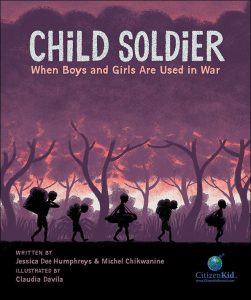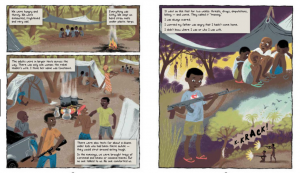

Title – Child Soldier When Boys and Girls Are Used in War
Author(s) – Jessica Dee Humphreys & Michel Chikwanine
Illustrator/Photographer – Claudia Davila
Publisher and Year – September 1, 2015 by Kids Can Press
Number of pages – 48 pages
Tags/Themes – Rylie Loux, 6-8, Graphic Novel, Emotion, Family, Culture, Friendship,
Genre – Graphic Novel
Descriptive Annotation: An ex–child soldier tells his horrifying story, that begins by being kidnapped at the age of 5 and forced to kill his best friend. Michael was abducted by a rebel militia at age five while growing up in the Democratic Republic of Congo in the 1990s. Michel and his best friend, Kevin, are kidnapped with other boys by a rebel militia when they’re playing soccer on the field after school. They’re thrown into trucks and taken to the soldiers’ camp in the hills, where Michael is forced to become a child soldier. While they are kidnapped they are beaten, cut with knives, forced to consume cocaine, and even killed. Michel is blindfolded, a gun is put into his hand, and someone behind him grabs his fingers, puts one on the trigger, and forces it to shoot. A soldier takes off the blindfold and Michel sees he’s killed Kevin. After Michel escapes and returns home, he continues to suffer because his father is kidnapped and tortured and sent to a refugee camp in Uganda. The family joins him there, and after his father’s death, Michel, his mother, and one sister migrate to Canada when he’s 16.
Classroom Application: This is a perfect resource for engaging students in social studies lessons on global awareness and social justice issues, and classroom discussions about conflict, children’s rights and even bullying. This can associate with other historic events that are similar. They’ll also gain an awareness that the horror of child soldiers remains an issue in many countries of the world today, as well as military services. As a teacher, you can ask your students if they know that young adults are forced into the military and where is this still happening in our world today? Another ideology that this book presents is the idea of making a difference in your own and someone else’s life. This story shows how much has changed since the 1990s but how there is always room for someone to make an advancement.
Linguistic and Cultural Diversity Analysis: This book represents the culture of the Democratic Republic of Congo. This story is used to teach students and generate discussion about the history in different countries. Davila’s illustrations stay clear of explicit violence, using facial expressions to convey vividly the rebels’ brutality, the shock of their child captives, and the narrator’s emotional scars. This is giving students a realistic glimpse of what happened in the 1990s. This book also gives important political and historical context to these events.
Quotes –
“Your family will never take you back now. We are your only family.”
“Working together, we will make positive, changes in the world. As my father used to tell me, “If you ever think you are too small to make a difference, try sleeping in a room with a mosquito.”
